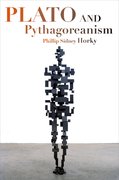On Friday 24 Feburary, I will be speaking at the Centre National de la Recherche Scientifique (CNRS) in Paris at an annual rolling colloquium entitled “Séminaire de la Société d’Études Platoniciennes“. The talk there will be on the natural philosophy of the early Pythagoreans, with special emphasis on the concept of numerical identity in the extant writings of the mathematical Pythagoreans.
This topic is central to my forthcoming book project, since, if I am right in identifying mathematical Pythagoreanism as supplying a philosophically relevant approach for Plato, I need to establish how it is philosophically relevant at all. The paper will focus on two figures whom I consider especially important for early Pythagorean philosophy, and whose philosophical concepts are akin: the comedian Epicharmus of Sicily, and the cosmologist Philolaus of Croton. In particular, Epicharmus and Philolaus try to come up with ways of defining and identifying natural objects by means of numbers.
One philosophical concern of these early Pythagoreans has to do with how number is predicated of all objects in nature. What are the consequences of the claim, so central to my personal identity, that I am one human being? Epicharmus in particular has a humorous take on this. Two figures on stage seem to be talking about debts (?):
Speaker A. But suppose someone chooses to add a pebble to an odd or even number, whichever you choose, or to take away from those that preexist – does it seem to you that it [i.e. the number] would be yet the same?
Speaker B. Not to me, it doesn’t.
Speaker A. Nor even if someone were to choose to add another length to a cubit-measure, or to cut off from what was there beforehand – would that measure still be there?
Speaker B. Surely not.
Speaker A. Now look at humankind this way: for one man grows, while another decreases, and all men are in a state of exchange throughout all time (ἐν μεταλλαγᾶι δὲ πάντες ἐντὶ πάντα τὸν χρόνον). But whatever naturally is in a process of exchange and never remains the same (ὃ δὲ μεταλλάσσει κατὰ φύσιν κοὔποκ’ ἐν τωὐτῶι μένει) should be always different from what it had been changed from. Even so you and I were different men yesterday, and even now we’ve turned out different today, and again we will turn out different [tomorrow] and never the same, according to this argument.’
(Psuedepicharmeia F 276 K.-A. = Diogenes Laertius 3.9 = FGrHist 560 F 6)
What I aim to discuss in my talk, entitled “Philolaic Nature and Preexistent Being”, is how this passage reflects a broader concern among early Pythagoreans how one might posit a stable ontological entity in a world of flux. If it is an ontological constant that we are always in a “state of exchange” (as the speaker describes it here) throughout our lives – either growing into flourishing or declining towards death – are or are we not the same person at any given two times of our life? Is there more than one of us?

